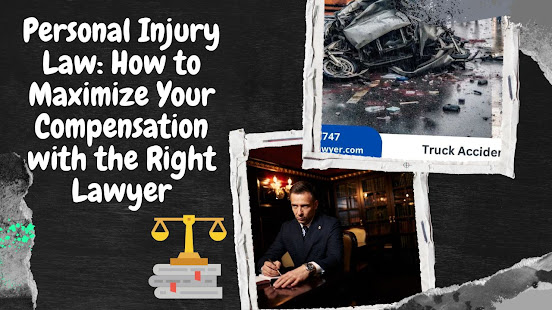Personal Injury Law: How to Maximize Your Compensation with the Right Lawyer
Understanding Personal Injury Law
Personal injury law, also known as tort law, provides legal recourse for individuals who have suffered harm due to the negligence or intentional actions of others. It encompasses a wide range of scenarios including car accidents, medical malpractice, workplace injuries, and slip-and-fall incidents. The fundamental objective of personal injury law is to compensate victims for their losses and to deter others from committing similar offenses.
The Importance of Choosing the Right Lawyer
Expertise and Specialization
Choosing a lawyer with expertise and specialization in personal injury law is crucial. An experienced attorney will have a deep understanding of the law, familiarity with insurance company tactics, and a track record of successful case outcomes. This expertise can significantly impact the compensation you receive.
Reputation and Reviews
A lawyer’s reputation is a strong indicator of their capability. Research reviews and testimonials from former clients to gauge their professionalism, dedication, and success rate. A reputable lawyer will be known for their ability to secure favorable settlements and verdicts for their clients.
Communication and Transparency
Effective communication is essential. The right lawyer will be responsive, listen to your concerns, and keep you informed throughout the legal process. Transparency regarding fees, case progress, and potential outcomes is also critical for building trust and ensuring a smooth legal experience.
Maximizing Compensation in Personal Injury Cases
Thorough Documentation
Documenting everything related to your injury is vital. This includes medical records, photographs of injuries, accident reports, and any correspondence with insurance companies. Detailed documentation supports your claim and can significantly increase the compensation you receive.
Calculating Full Damages
Work with your lawyer to ensure all potential damages are accounted for. This includes not only medical expenses and lost wages but also non-economic damages like pain and suffering, emotional distress, and loss of enjoyment of life. An experienced lawyer will help quantify these damages accurately.
Negotiation Skills
Negotiating with insurance companies can be challenging. Insurance adjusters aim to minimize payouts, but a skilled lawyer will have the negotiation expertise to advocate effectively on your behalf. Strong negotiation skills can lead to higher settlement offers.
Trial Readiness
While many personal injury cases are settled out of court, being prepared to go to trial can provide leverage during settlement negotiations. Insurance companies are more likely to offer a fair settlement if they know your lawyer is ready and willing to take the case to trial.
The Legal Process in Personal Injury Cases
Initial Consultation
The process begins with an initial consultation with a personal injury attorney. During this meeting, the attorney will evaluate the case, discuss potential outcomes, and explain the legal process.
Investigation
The attorney will conduct a thorough investigation to gather evidence.If a fair settlement cannot be achieved, the attorney will initiate legal proceedings on behalf of the victim by filing a lawsuit. This formal documentation delineates the plaintiff’s grievances and the sought-after damages.
Filing a Lawsuit
During the subsequent discovery phase, both parties engage in the exchange of information and evidence gathering. This multifaceted process may encompass depositions, interrogatories, and requests for pertinent documents.
Discovery
In many instances, personal injury disputes are resolved through the process of settlement negotiations. Here, the attorney assumes the role of mediator, engaging in discussions with the defendant’s insurance company to arrive at a mutually acceptable resolution.
Settlement Negotiations
Should negotiations fail to yield a satisfactory outcome, the case proceeds to trial. At this juncture, the attorney assumes the responsibility of presenting the evidence and advocating the plaintiff’s case before a judge or jury.
Trial
In terms of compensation, personal injury cases typically involve economic and non-economic damages. Economic damages serve to indemnify victims for financial losses, encompassing expenses such as medical bills, lost wages, and property damage. Conversely, non-economic damages address intangible losses like pain and suffering, emotional distress, and diminished quality of life.
Compensation in Personal Injury Cases
Additionally, punitive damages may be warranted in egregious cases, serving both as a means of retribution against the defendant and as a deterrent against future misconduct.
Punitive Damages
It is imperative to recognize the significance of the statute of limitations, which delineates the timeframe within which a personal injury law suit must be initiated. Failure to adhere to this temporal constraint may result in the forfeiture of one’s legal rights. Thus, prompt consultation with an attorney is paramount to ensure compliance with these statutory requirements.
Statute of Limitations
In conclusion, optimizing compensation in personal injury cases hinges upon the expertise and acumen of a competent attorney. By diligently selecting legal representation possessing the requisite specialization, reputation, and communicative prowess, coupled with meticulous documentation and readiness for negotiation and litigation, plaintiffs can markedly augment their prospects for favorable compensation outcomes.
